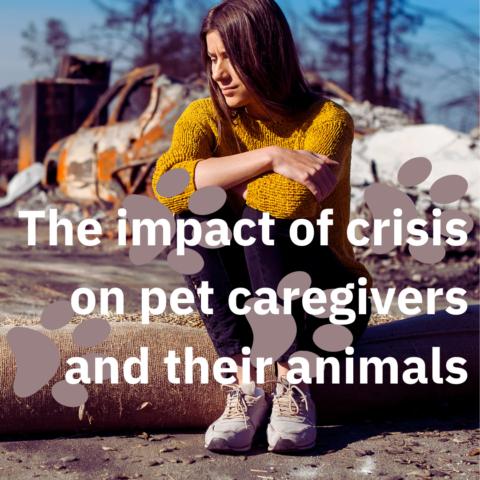In recent years, various studies have been conducted to understand the impact that crises such as domestic violence or environmental disasters can have on owners and their pets. For example, Dogs Trust (2019) found many survivors of domestic abuse had experienced their pets being abused or their ability to care for their pets restricted; 97% of participants stated pets were often used as a means of controlling and coercing someone experiencing domestic abuse, and 9 out of 10 participants said that some survivors would not leave their home without knowing their pet will be safe.

Now, Jasmine Montgomery and colleagues (2024) have highlighted the profound psychological and safety risks that arise from the forced separation of individuals from their pets during such crises. The team from James Cook University in Australia conducted an in-depth analysis that reviewed 27 years of international research and focused on crises that included instances of domestic violence, homelessness, and natural disasters. Their comprehensive review not only shed light on the emotional toll experienced by pet caregivers when separated from their beloved animals but also revealed the potential for harm to the animals themselves.
The key findings
There were a number of key findings from Montgomery et al.’s study, published in the journal Anthrozoös.
- The depth of the pet-owner bond: Montgomery et al. noted the depth of the connection between people and their pets and how this bond often provides significant emotional support and companionship. In times of crisis, the threat to the animal-owner bond can lead to heightened psychological distress for pet owners, further complicating already difficult situations.
- A lack of pet-inclusive support services: A critical finding in this review is the glaring lack of support services that cater to both humans and their animals, such as housing and other care. This deficiency forces individuals to make heart-wrenching decisions between seeking safety and staying with their pets, which can delay or prevent the pursuit of refuge, increasing the risk of psychological distress and potential harm. For example, often, people delay fleeing an abusive relationship where the animal left behind could be at risk of being killed in retaliation. Other owners avoid evacuating their homes during natural disasters or prolong their homelessness while waiting for pet-friendly accommodation rather than being forced to separate from their animal[s]. The study also noted that financial costs, housing policies, and a shortage of suitable facilities for pet caregivers all impact people’s abilities to keep their animal[s] when faced with a housing crisis. Furthermore, where natural disasters occur, this increases the housing crisis and the risk of being homeless for pet owners.

What can we learn from such findings in the UK?
Although the UK has experienced earthquakes, hurricanes, tornados, and more, floods are the most common form of natural disaster in Britain. And, sadly, domestic violence and homelessness are universal factors. So, research like that from Montgomery et al. serves as a crucial reminder of the importance of emergency preparedness that incorporates plans for pets.
This includes but is not limited to:
- Creating and maintaining a list of pet-friendly facilities/shelters/short-term accommodation.
- Ensuring you have a first aid kit for yourself and one that also caters for your pet[s] too.
- Gaining knowledge of local support services can help pet owners protect their furry friends during crises, such as domestic violence. See below for more on this.
Useful resources
Below are a list of organisations with hyperlinks that you may find helpful in preparing ahead in the event of a crisis, or if you need to urgently seek refuge.
- The National Domestic Abuse line is 0808 2000 247.
- Refuge supports victims of domestic abuse.
- The Links Group is made up of animal organisations that can help support owners with fostering services for dogs for up to 6-9 months if you are thinking of leaving an abusive relationship and need to access a refuge or emergency housing.
- For cat owners, see LifeLine fostering service.
- For those in the north west of England, see Paws for Kids fostering network.
- For advice on disaster preparedness, visit The Red Cross.
- See RSPCA’s guidance on keeping animals safe during floods.
- Sign up for flood warnings via the Gov.uk website.
Key take-aways
The study from Montgomery et al. contributes to a growing body of research advocating for the recognition of the human-animal bond within societal structures and the positive impact of pets on human mental health and well-being (Applebaum et al., 2020; Gee et al., 2017). Hence, it serves as a wake-up call for the development of policies and services that respect and preserve the human-animal relationship.
What difference can we all make? Well, we need to advocate for a shift in societal attitudes to ensure that in times of crisis, the welfare of both humans and their animal companions is safeguarded so that pets and their caregivers can stay together during times of emergency.
And for those of us with pets, this research reinforces the necessity of being proactive in preparing for potential crises.
References
- Applebaum, J. W., Peek, C. W., & Zsembik, B. A. (2020). Examining U.S. pet ownership using the General Social Survey. Society & Animals, 28(1), 8-26.
- Dogs Trust. Pets and domestic abuse (no date) Freedom. Available at: https://www.dogstrustfreedom.org.uk/refer-a-client/pets-and-domestic-abuse-.
- Gee, N. R., Rodriguez, K. E., Fine, A. H., & Trammell, J. P. (2017). Animals in educational settings: Research and practice. In A. H. Fine (Ed.), Handbook on Animal-Assisted Therapy (pp. 195-210). Academic Press.
- Montgomery, J., Lloyd, J., & Liang, Z. (2024). A Scoping Review of Forced Separation Between People and Their Companion Animals. Anthrozoös, 245-267.
Learn more about our classes

Get Hanne's book, clothing and more
Hanne has a number of publications including her book Playing With Your Dog to help owners work out the games that are best suited for their pet to play throughout his life, from puppyhood to old age, available from Amazon. Check out Hanne's range of contemporary casuals The Collection – for pet lovers made from recyclable, organic materials that are sustainably sourced.

